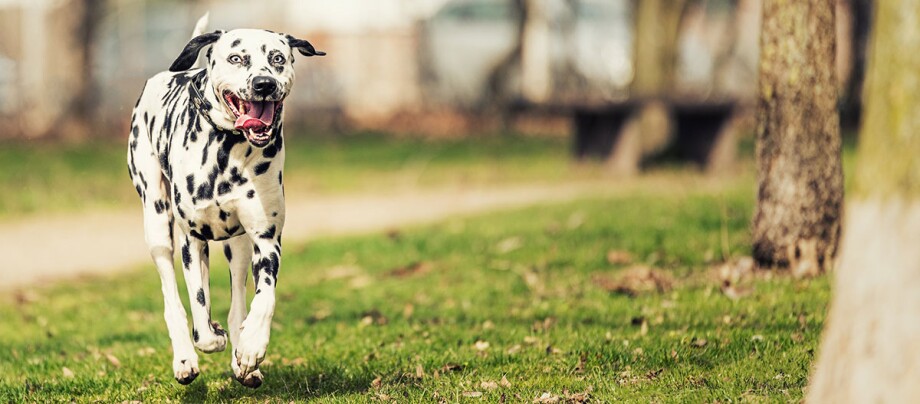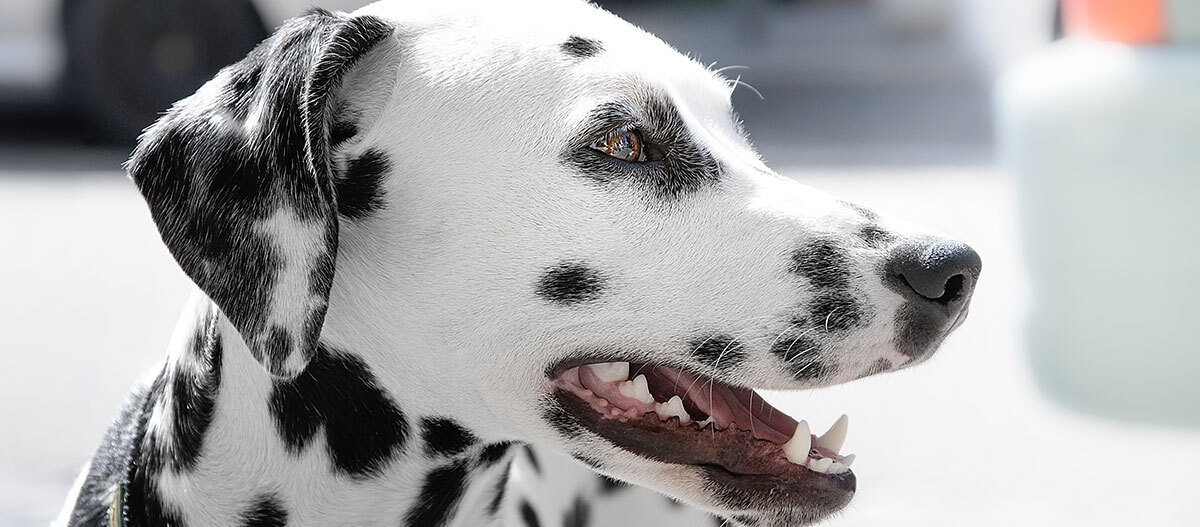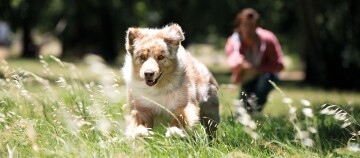Dalmatian – a Lively Sensitive Sporting Type with a Lot of Charm
07.10.2022 - Reading time: 3 minutes

With their spotted coats, dalmatians are an usual breed. But these dogs don’t only have an exclusive look, they are as elegant as they are intelligent and make great sport buddies and loyal friends. It’s a preconception that they are a nervous and complicated type of breed. When looked after in the right way, dalmatians are a sporty and sensitive companion.
NewsletterDalmatian
Breed | Dalmatian |
Origin | Possibly Croatia |
Classification | Hounds, bloodhounds and related breeds |
Size | Males 56 to 62 cm at shoulder height – Females 54 to 58 cm at shoulder height |
Weight | Males 27 to 32 kg – Females 24 to 28 kg
|
Physique | average-size, athletic |
Eyes | brown or amber coloured, blue eyes are not desired for breeding
|
Ears | Lop ears |
Coat and colour | Short stature, solid and strong; characteristic black or dark brown spots on a white base
|
Special features | Puppies are born with white fur and develop their spots after approximately 14 days
|
Nature | lively and sporty, adaptable, cuddly and sensitive |
Care | regular grooming
|
Health | vulnerable to skin and bladder problems, predisposed to deafness due to breeding, genetic enzyme defects, requires food low in purine, care with certain medicines (avermectine), MDR1 deficient |
We have the best products for your Dalmatian!
Ancient ancestors
The exact origins of Dalmatians is unclear. Ancient Babylonian and Egyptian murals show spotted dogs, other trails lead to the Dalmatia region in modern-day Croatia. The visually impressive dogs were initially to be found amongst nobility and were sporadically used as hunting dogs. Their unique coat, however, was no good as camouflage when hunting. Dalmatians primarily served as companions. They were often used to escort carriages. No wonder then, that nowadays Dalmatians still have the endurance to walk long distances. It was in England in 1880 that procedures for their breeding were first set out.
A Dalmatian's character
The spotted four-legged friend is a bundle of energy and has a good feel for its owners mood. This makes them good service dogs who make great therapy and companion dogs. Thanks to their friendly nature they get on well with people, are clingy and sometimes just as cuddly as cats. Alongside this devotion, they are a bundle of energy. Dalmatians are also highly intelligent. They learn tricks quickly and enjoy plenty of play.
Training and keeping a Dalmatian
To raise a Dalmatian properly, you need patience and a stable personality. Despite their connections to humans, Dalmatians are very independent and like to do what they want. Therefore, consistency is needed, any doubts about who is the master must not be seen. Dalmatians are certainly very sensitive and will get annoyed if they think that they’re being treat unfairly. Positive reinforcement and praise are more helpful than berating them and force. Dalmatians are creatures of habit and react negatively to changes in their daily lives. The dog should be part of the family’s daily activities. Due to their original breeding purpose as a running dog Dalmatians are perfect companions for sporty people. They will happily run alongside joggers, horse riders and cyclists, they love agility and tracking games. For a well balanced life, they need to use up all their energy. Due to their size they require a lot of space. Keeping them in a small apartment without enough space to run or in a small kennel is, therefore, a no-no. Dalmatians have a well-founded protective instinct. So that this doesn’t manifest as unwanted behaviour with others, puppies need to socialise with other animals from a young age.

Caring for a Dalmatian
Caring for your Dalmatian’s coat is very easy: Brush your dog daily with a rubber brush for the best results. Since they can drop hair all year round, it’s important to remove loose hair regularly to avoid hairs on your furniture and textiles which are hard to remove. Dalmatians have a healthy appetite, therefore, you should keep an eye on their calorie intake. The lower the Dalmatian’s pigment, the larger the hereditary change of deafness can be. Choose your pet – and this applies to all dog breeds – from a professional dog breeder.


